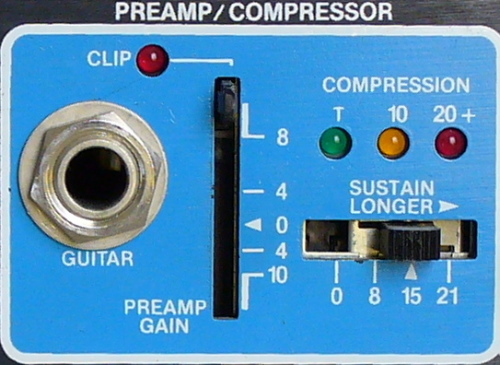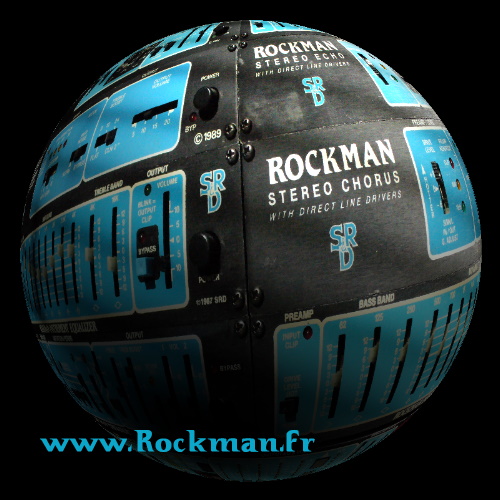If you are visiting this Rockman website, you probably know by heart every song by Boston. If you're a newcomer, or simply if you're not american, Boston is probably just another band for you.
Well, I'm not american, I came very late to Boston's music, and I became addicted to this music in a few weeks, thirty years after Boston's debut album, and thirty years after starting to play guitar. Something must be different in this music...
Discovering Boston made me cope with two new situations.
First, I spent several weeks listening continuously to the five albums. Just as if I was a teenager again... Can you imagine being 42, and listening to 5 CD's in row, then playing them again, during two or three months ? That was a weird situation, and when I face something weird, I need explanations.
The second surprise was instrumental: Boston's music sounds like plain classic rock, but unlike 99% of what you hear on the radio, you have to work a little if you want to play it correctly. I'm not an international guitar wizard, but after 30 years of instrument, it's kinda puzzling!
Let's try to find answers and explanations to these two questions...
|
 |
The musical structure
The instrumental issue was easy to understand: Boston is a guitar band and sounds like a guitar band, but the cultural basis of the main songwriter is keyboards/classical music oriented, while a part only is guitars/pop-rock oriented.
The structure of the scores themselves is not a basic rock structure. Rock music is usually made of three tiers:
- Rythm tier: bass & drums, enhanced by guitar riffs
- Harmony tier: keyboards (left hand), guitar chords
- Melody tier: vocals, lead guitars, keyboards (right hand)
|

Picture courtesy of The Mandelbrot Dazibao |
Now, pick a Boston song at random, and say "I'm gonna play the rythm guitar part". On many songs, you just won't do it, cause several guitars come and go, answer each other, or interleave rythmic and melodic parts. The structure of the tracks is very similar to what you find in classical music orchestras : the music is a collective construction, made of interleaved, multi-instrumental sentences.
Another trick, more classical (I use it myself to write music): keyboards melodies played on a guitar. In basic pop-rock music, keyboards play keyboard parts, and guitars play guitar parts. There is no real merging of the two approaches. In Boston, some songs are 100% guitar tracks (More than a feeling, Longtime,...), while others alternate guitar licks with Hammond or piano parts (We're ready, Used to bad news, ...). And of course, some tracks are fully keyboards oriented. That's the classic, "normal" situation. In some tracks, if you take time to play the song on a guitar first, then on a piano or an organ, you will find it more natural to play the guitar solo on the keyboard : I think "We're ready" and "Can'tcha say" are good examples, and one can wonder if the lead guitar of "Don't look back" was written with a neck in hand, or with keys under the fingers.
|
To make it short, Boston songs are far from being simple, and it's not a surprise when you know it takes eight years to write, record and post-product a Boston album... If you never listened to this music with an analytic approach, take a few hours to listen to it instrument by instrument, as I had to do it before understanding why this music was so fascinating and addictive. This analysis can be made in terms of scales, modes and chords progressions, but even without that musicology formalism, you will feel the difference with other rock bands. |
The sound of Boston
Boston is often described as the band which has invented the AOR sound. Yet, Boston is also the band that has a unique sound, immediatly recognizable and never copied...
What is this sound made of?
Some ingredients are purely technical, and have been used by other bands: natural chorus, stereo doubling, tape saturation, etc... Tom Scholz has a very specific way to combine them: the stereo image on Boston is one the widest ever. Listen to "Smokin", or "Hitch a ride", for example: that's what stereo was made for.
The drums were conventional on the first two albums. In the early eighties, Tom Scholz started experimenting triggered sampled drums sounds, burnt on EPROM's, but also humanized drums sequencing: about one half of Third Stage was recorded that way. On Walk on, all the drums (snares and toms) are sampled sounds, played by a real drummer (Dough Huffman) with realtime triggers on real drums. The cymbals were overdubbed live cymbals: sampling techniques and high frequencies never really matched...
The bass parts have nothing special. Plain, round sound, more or less brilliant or dark, depending on the song. The bass is usually considered as a rythmic instrument, but it's also a guitar. In Boston's music, some bass parts are real guitar parts, meaning that the instrument is allowed to play the same riff or progression as the 6 strings. This is another example of the classical construction of Boston's music: the bass guitar is used sometimes like in classical orchestras, where the double-bass is more a bass-violin than a purely rythmic instrument.
The Hammond organ has of course a huge place in Boston, not only musically, but also physically speaking - the stage design has a strong focus on the organ. Some piano from time to time (A man I'll never be). Some strings can be heard in the more recent songs (Living for you), but when layers are necessary, the Hammond B3 is here and is entirely sufficient.
Nothing really special as for now, and one could even say: "OK, it's just a matter of guitars, but lots of bands are guitar-oriented and don't sound like Boston".
The first type of guitar sound in Boston's music is the acoustic and clean electric sound. They are strictly arpeggios or rythm dedicated. One can perfectly use an acoustic guitar or a clean electric to play a solo, but you won't find this in Boston's music:
- Clean electric guitars and acoustic guitars are always used in rythmic roles, usually playing arpeggios (More than a feeling, Don't look back), or sometimes plain chords too (Peace of mind, Amanda).
- All the lead guitars, and most of the rythm guitars too, have distortion sounds, and these distortion sounds are all highly compressed, and carefully EQ'd. More than anything else, pre-distortion compression is the signature of Boston guitar sound.
As a matter of fact, the clean electric guitars are processed to have the same role in the mix as a rythm acoustic guitar. This was later developed in the Rockman line and became the Acoustic Guitar Pedal.
Did you notice there is absolutely no brass in Boston's songs? Brass instruments belong to rock'n'roll since it was created in the fifties. A brass section is helpful for the composer, who can include long notes in the score, or use some strikes as a sort of punctuation. Well, there is no trumpet, no trombone, no sax in Boston's music. And no one misses them. No-one misses them cause the guitars in Boston can do the same job.

Input stage of a Rockman Sustainor |
If you know the Rockman products a little, you have probably noticed that there is always a compressor at the beginning of the chain. You also know that EQ's are widely used, before and after the distortion stage. These subjects will be discussed in detail in other sections of Rockman.fr, but I personnally consider that the constant use of compression on guitars, joined to an extensive and precise use of predistortion EQ's, is the most critical point in Boston's sound.
With these two little helpers, compression and EQ'ing, Tom Scholz managed to create a guitar tone where the harmonics are always the same, from the beginning of the note till its end. Just like a sax or a trumpet - except it doesn't sound like brass.
I'm not saying that the objective of Tom Scholz was to imitate a sax with his guitar. I'm not saying that he doesn't like brass instruments (though I think it's highly probable).
But the guitar sound he has created allowed him to write his music without them, while all the classic rock bands, at a moment or another, have used a sax or a brass section. Boston never did it... |
|
A quest for perfection?
I'm a guitarist, and I must admit I don't pay to much attention to other instruments, but for few exceptions. I feel ashamed to say it, but I'm a guy who can skip two-thirds of a song just to reach directly the guitar solo... Well, Boston belongs to the bands I can listen to from A to Z, without skipping songs or even parts of songs. Not that all tracks are major hits, or that all instruments scores are outstanding. No. The reason is that every song of Boston was carefully designed as a whole, every single note being obviously selected or rejected. Tom Scholz became famous for several reasons, one of them being his compulsive quest for perfection.
This perfectionnist attitude has been widely discussed. But perfection is a relative concept, that depends on your culture and personality. Yes, Boston sold a lot, but the simple fact that Boston makes popular music, for some people, means it cannot be a perfect music.
So rather than saying "Boston sound is perfect", "Boston guitar parts are perfect", etc... let's just say: Boston music corresponds to a unique situation where a man, Tom Scholz, managed to make every detail compliant with his vision of music. Most of the bands, especially the big names, work under the pressure of the production and commercial system. Not Boston. A Boston album is not issued until the music, the gear itself, the recording and post-productions are 100% compliant with Tom Scholz's requirements. The result is therefore totally consistant, while other records have great music but a poor sound, others have great lyrics but the singer has no voice, etc..., etc...
|
If a record could be visualised as a 3D shape, Boston records would be a perfect sphere, while others would take various shapes at random. So if you think a sphere is a beautiful object, you will like Boston. If a sphere is for you a boring object of no interest, well, just don't listen to Boston...
When you're done with this analytic approach, come back to what Boston was created first: pure aural pleasure. If you think that making your own troubles public via your music is a good therapy. If you consider that knowing others have more troubles than you can help you feel better. If you find it interesting to see people suffer, instead of trying to make them feel better, then you will probably find Boston boring and, why not, naive.
I have suffered in my life, like thousands and millions of human beings. I have learnt one thing I strongly believe in: the only way to feel better yourself is to help others feel better. That's how Boston's music was created: a pure energy delivery, available on request. Just turn on some music to start your day, especially when the sun is gone: you will slip away with this familiar song... |

Picture courtesy of The Mandelbrot Dazibao |
The lyrics and voice of Boston
This paragraph was written a few weeks before March the 9th, 2007. Words are missing to say everything...
Boston's music is made by instruments, but Boston is also a voice. Brad Delp belongs to this small "golden voices club", where you will find, depending on your tastes, people like Jon Anderson, Freddy Mercury, Linda Ronstadt or Paul McCartney. Voices with a range, voices with depth, voices with a signature. The vocal melody of the historical hit, More than a Feeling, ranges from D2 to D4. You need a plain two octaves voice to sing that. Brad added a peak at G4... Of course, you cannot compare studio work with the classical domain, where only full voice is taken into account. But all in all, Brad Delp covers bass, baryton and tenor ranges: that's what it takes to have a golden voice...
Voice is nothing without lyrics. Tom Scholz wrote most of Boston songs, letting others complete his writing in the late albums, with a slight change of mood.
Here are the key words you will find in Boston lyrics, sorted by number of occurences. The list in itself is interesting:
| Love | 92 |
| Feel, feeling | 69 |
| Day, everyday, today | 54 |
| Believe | 52 |
| Say | 49 |
| Now | 43 |
| Away | 42 |
| Right, alright | 40 |
| Time | 39 |
| Man | 35 |
| Mind | 33 |
| Dream, dreamer, dreaming | 27 |
|

The Atlantic Ocean at Biarritz: Boston is straight ahead! |
|


